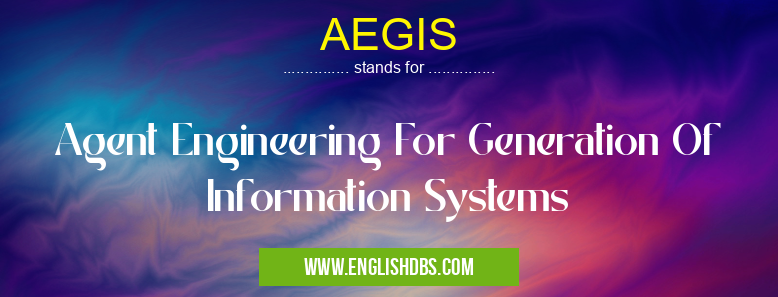What does AEGIS mean in SOFTWARE
AEGIS is an agent engineering approach for designing and developing complete information systems that take into account the needs of the user, the environment, and the system. This approach helps in optimizing the performance of the software by taking into consideration not just its functional requirements but also its non-functional characteristics. It focuses on creating modular, scalable, and extensible architectures to ensure a more reliable, secure, efficient, and maintainable product. The aim is to create applications that effectively manage computer resources while offering meaningful information to users.

AEGIS meaning in Software in Computing
AEGIS mostly used in an acronym Software in Category Computing that means Agent Engineering For Generation Of Information Systems
Shorthand: AEGIS,
Full Form: Agent Engineering For Generation Of Information Systems
For more information of "Agent Engineering For Generation Of Information Systems", see the section below.
Process
AEGIS follows a systematic process of agent-oriented modeling (AOM) where different aspects of an application are modeled according to their relevance in the context of a specific problem domain. In this stage, models are first developed based on existing requirements. These models contain descriptions or representations of all entities involved in the task such as agents, organizations, processes, data flows etc. After developing models based on existing user needs and constraints or forming hypotheses about it's desired behavior, these models can be validated against empirical evidence derived from simulations or field tests if available.
Benefits
The AEGIS approach offers numerous benefits when compared with traditional software engineering approaches such as easier maintenance due to modularity; less implementation effort due to scalability; better performance due to optimized resource utilization; improved security through access control mechanisms; increase flexibility by authorizing extensibility; and support for dynamic evolution through autonomous agents which provide enhanced monitoring capabilities. In addition to this AEGIS also allows for faster implementation cycles by introducing iterative development processes characterized by shorter cycles & faster iterations thus reducing overall project costs & risk.
Essential Questions and Answers on Agent Engineering For Generation Of Information Systems in "COMPUTING»SOFTWARE"
What is AEGIS?
AEGIS stands for Agent Engineering For Generation Of Information Systems. It is an engineering environment created to allow developers to build agent-based systems more easily and quickly. AEGIS is a set of tools and techniques used to create and manage distributed applications that depend on autonomous software agents.
What are the benefits of using AEGIS?
Using AEGIS helps developers reduce development time by allowing them to automate certain tasks, such as developing complex algorithms or distributing work among multiple machines. Additionally, it can help improve system performance by allowing agents to distribute the processing load over multiple machines.
How does AEGIS work?
AEGIS works by providing an environment in which developers can build autonomous agents that can interact with each other. The environment provides access to a wide range of services which allow agents to share data, collaborate on tasks, and retrieve information from external sources.
How do I get started with AEGIS?
To get started with AEGIS, you will need a programming language such as Java, C++ or Python and some basic knowledge of agent-based systems. Additionally, there are many tutorials available online that can provide guidance on how to use the various features provided by the AEGIS environment.
What are the system requirements for running AEGIS?
The minimum system requirements for running AEGIS include a modern operating system such as Windows 7 or later; at least 1GB of RAM; an 802.11 wireless network adapter; and up-to-date software applications such as Java Runtime Environment or Visual Studio Code.
What kind of programming languages does AEGIS support?
Currently, AEGIS supports Java, C++ and Python as programming languages for developing agent-based systems within its environment.
Does AEGIS integrate with existing applications?
Yes, it does! One of the key features of the environment is its ability to integrate with other applications and data sources in order to present users with useful visualizations, analytics and reports—all while maintaining secure communication between different platforms.
Is there any way to simulate an agent-based system using AI capabilities?
Yes — one of the unique features that sets apart AEGIS from other engineering environments is its powerful artificial intelligence (AI) capabilities which allow users to create simulated environments through which they can test their applications before launching them into production mode.
Final Words:
AEGIS is an effective approach for designing facts-based intelligent systems that respond dynamically depending on situational changes while providing meaningful information. It provides several advantages over traditional software engineering techniques such as increased productivity along with better performance, robustness & security while promoting flexibility through autonomous agents & extensible architectures. Thus AEGIS is an ideal choice for building robust yet flexible Information Systems that are well suited for today's complex computing environments.
AEGIS also stands for: |
|
| All stands for AEGIS |
